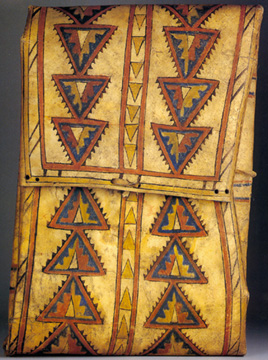This morning in math class we started a new topic: Geometry!
Rather than just keep to the typical "What-is-a-point? What-is-a-midpoint? What-is-a-coplanar-line?" geometry introduction, we took a step further to look at the Native American friezes in clothing and quilting works. It turns out that there are just seven ways to manipulate a tile into a border pattern.
(Seven is a happy number that shows up everywhere: 7 Grandfather teachings, 7 ages of man, 7 days of the week, 7 classical planets, 7 musical notes, 7 pillars of wisdom, 7 chakras, and seven also represents the Universe with the 3 of heaven combined with 4 of the world.)
 For inspiration, we watched a video from NOVA, "Fractals: Hunting the Hidden Dimension". A fractal is just a repeating pattern where the smaller parts actually look like the bigger parts when you zoom in all the way -- happening over and over again, forever!
For inspiration, we watched a video from NOVA, "Fractals: Hunting the Hidden Dimension". A fractal is just a repeating pattern where the smaller parts actually look like the bigger parts when you zoom in all the way -- happening over and over again, forever!Here are some colourful examples of fractals -- sometimes fractals are used to show naturally occuring examples in nature, like mountains and cauliflower and tree branches. Sometimes they're just amazing patterns:
Notice how the smaller parts look like miniature versions of the overal picture? That's what makes the pattern a "fractal". Check out how the following simple geometric shapes gradually turn into complex fractals -- see if you can come up with your own pattern:
Posted by Karen





No comments:
Post a Comment